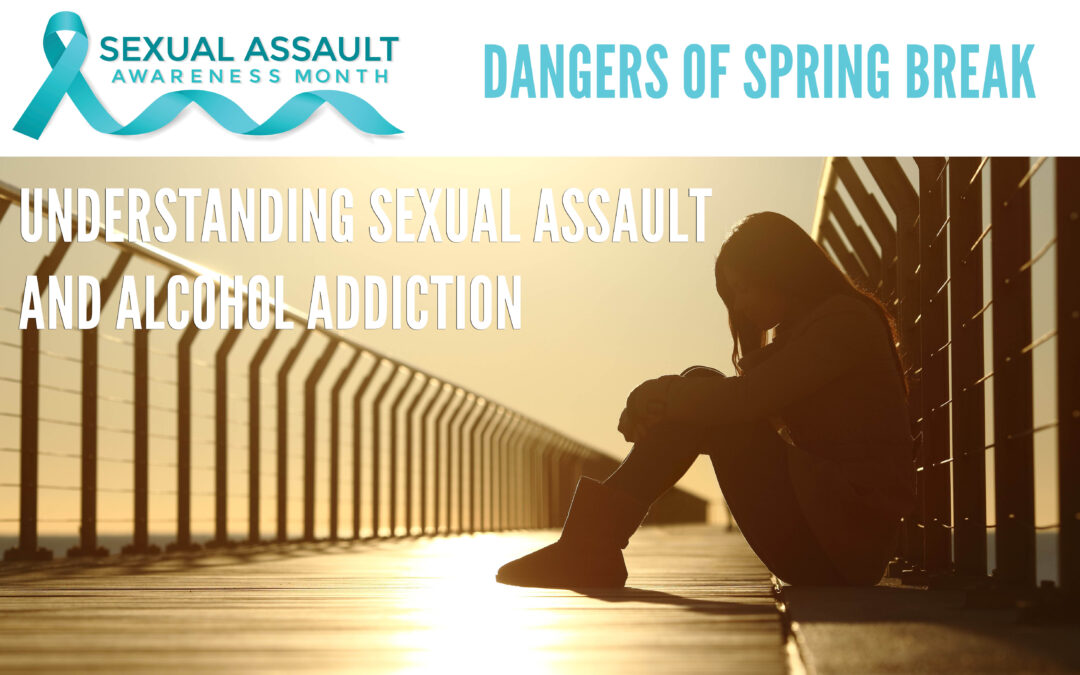Sexual Assault Awareness Month (SAAM) and spring break coincide, providing a poignant reminder of the importance of promoting awareness and safety during this celebrated time of year. While spring break is often associated with fun and relaxation, it’s essential to recognize the sobering realities of sexual assault and its connection to alcohol addiction. In this blog post, we will delve into the intersection of sexual assault, alcohol addiction, and spring break, shedding light on the complexities of these issues and the steps individuals can take to prioritize their well-being during this time.
Understanding Sexual Assault Awareness Month:
Sexual Assault Awareness Month (SAAM) is observed every April, serving as a time to raise awareness about sexual violence, support survivors, and promote prevention efforts. Throughout the month, communities come together to educate the public, advocate for policy changes, and provide support services for those affected by sexual assault.
- Education and Advocacy: SAAM focuses on educating individuals about the prevalence and impact of sexual violence, challenging harmful attitudes and behaviors, and advocating for systemic changes to address the root causes of sexual assault.
- Support for Survivors: SAAM also aims to provide support and resources for survivors of sexual assault, empowering them to seek help, heal from trauma, and access the support services they need to rebuild their lives.
- Prevention and Intervention: Prevention efforts during SAAM include promoting healthy relationships, consent education, bystander intervention training, and community outreach initiatives to address the underlying factors that contribute to sexual violence.
Spring Break: A Time of Celebration and Risk:
Spring break is a highly anticipated time of year for many students and young adults, offering a chance to unwind, have fun, and create lasting memories with friends. However, amidst the excitement of spring break festivities, it’s crucial to recognize the potential risks and dangers that may accompany this annual tradition.
- Alcohol-Fueled Celebrations: Spring break often involves alcohol-fueled parties, beach gatherings, and late-night revelry, creating an environment where excessive drinking and impaired judgment are prevalent. The combination of alcohol consumption and relaxed inhibitions can increase the risk of risky behaviors, including sexual assault.
- Vulnerability to Sexual Assault: The dynamics of spring break, including crowded venues, unfamiliar surroundings, and heightened social pressures, can create conditions where sexual assault thrives. Perpetrators may target individuals who are intoxicated or incapacitated, taking advantage of their vulnerability to commit acts of assault or abuse.
- Impaired Decision-Making: Alcohol consumption during spring break can impair judgment, cognitive function, and decision-making abilities, making individuals more susceptible to risky situations and less able to effectively communicate or defend themselves in the event of an assault.
The Connection Between Sexual Assault and Alcohol Addiction:
The link between sexual assault and alcohol addiction is complex and multifaceted, with each contributing to the perpetuation of harmful behaviors and negative outcomes.
- Vulnerability and Coping Mechanisms: Individuals who have experienced sexual assault may turn to alcohol or other substances as a way to cope with trauma, numb painful emotions, or self-medicate underlying mental health issues. This pattern of behavior can lead to the development of alcohol addiction or exacerbate existing substance abuse problems.
- Risky Behaviors and Impaired Judgment: Alcohol addiction can increase individuals’ vulnerability to sexual assault by impairing judgment, inhibiting risk assessment abilities, and lowering inhibitions. Individuals struggling with alcohol addiction may engage in risky behaviors or put themselves in dangerous situations that increase their likelihood of experiencing sexual violence.
- Trauma and Recovery: Survivors of sexual assault who also struggle with alcohol addiction face unique challenges in their recovery journey. Addressing trauma, healing from past experiences, and overcoming addiction require comprehensive support, specialized treatment, and a trauma-informed approach to care.
Promoting Awareness and Prevention:
As we observe Sexual Assault Awareness Month and embark on spring break festivities, it’s essential to prioritize awareness, safety, and prevention efforts to mitigate the risk of sexual assault and alcohol-related harm.
- Education and Empowerment: Educate yourself and others about the realities of sexual assault, alcohol addiction, and the intersection of these issues. Promote consent education, bystander intervention training, and healthy relationship skills to empower individuals to recognize and prevent sexual violence.
- Responsible Drinking Practices: Practice responsible drinking habits and encourage others to do the same. Pace yourself, know your limits, and prioritize your safety and well-being. Avoid excessive drinking, mixing alcohol with other substances, and engaging in risky behaviors that increase your vulnerability to harm.
- Support for Survivors: Offer support and resources to survivors of sexual assault, including access to counseling, advocacy services, and support groups. Create a supportive and non-judgmental environment where survivors feel heard, believed, and empowered to seek help and healing.
- Consent and Boundaries: Respect others’ boundaries, communicate openly and honestly, and prioritize consent in all interactions. Remember that consent must be freely given, enthusiastic, and ongoing, and that alcohol consumption impairs individuals’ ability to give and receive consent.
Conclusion:
As we navigate the complexities of spring break and observe Sexual Assault Awareness Month, let us commit to promoting awareness, safety, and empowerment in our communities. By addressing the intersection of sexual assault, alcohol addiction, and spring break, we can create a culture of respect, consent, and support that prioritizes the well-being of all individuals. Together, let’s work towards a future where every person can enjoy spring break festivities free from the threat of harm and violence.

